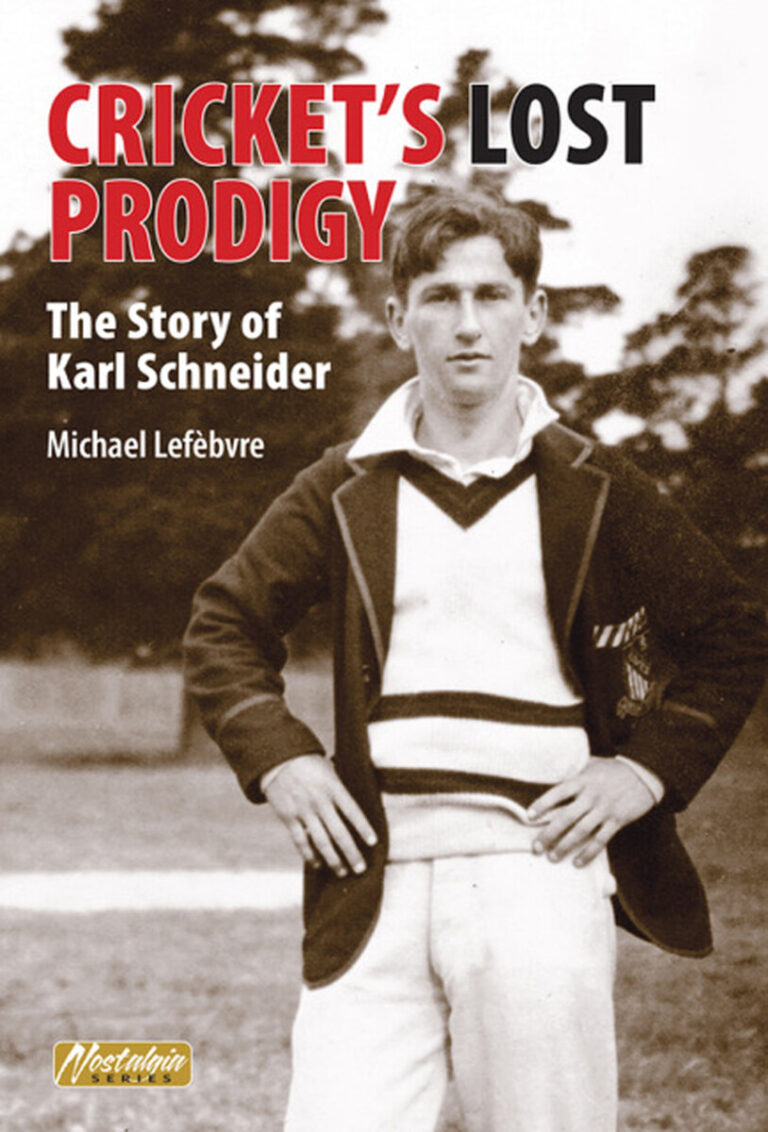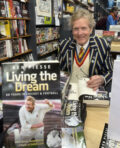No products in the cart.

KEN PIESSE’s just-published autobiography is a delightful mixture of fun, anecdotes and nostalgia, covering his 60 years in cricket and football
Here is a sneak peek:
The past can be intoxicating, compelling, mesmeric. The heroes of our youth are championed, their flaws and foibles forgiven. Like JM Barrie’s Peter Pan, they remain ever young, electric, ebullient.
 In 1965, Jack Potter made a classic double century in the annual Christmas ‘test’ between traditional rivals Victoria and New South Wales in Melbourne, the quality of his square driving against a high-class visiting attack of Dave Renneberg, Grahame Corling, a young Doug Walters and ‘The Little Fave’ Johnnie Martin reminding the selectors of an outstanding player with exquisite timing and flair. Yet, less than two years later, aged 29, Jack aborted his dream of playing for Australia and walked away from big cricket, having been told he was unlikely to make the next Ashes tour, in 1968…
In 1965, Jack Potter made a classic double century in the annual Christmas ‘test’ between traditional rivals Victoria and New South Wales in Melbourne, the quality of his square driving against a high-class visiting attack of Dave Renneberg, Grahame Corling, a young Doug Walters and ‘The Little Fave’ Johnnie Martin reminding the selectors of an outstanding player with exquisite timing and flair. Yet, less than two years later, aged 29, Jack aborted his dream of playing for Australia and walked away from big cricket, having been told he was unlikely to make the next Ashes tour, in 1968…
It was high holiday season and armed with floppy hat, zinc cream and multiple rounds of Mum’s home-cut vegemite and walnut sandwiches, I attended three of the four days, scoring the match ball-by-ball. I still have the page of Jack’s 221. Some reckoned he lacked self-belief and could be unsettled early by genuine pace. I thought he was a marvellous player and an even finer coach and captain. He had the courage to be different and back his instincts.
Years later I published his memoirs Born Lucky, which included his mentoring of the precocious Melburnian Shane Warne who, to Jack’s amazement, perfected within days a flipper he’d just been shown. Bill Lawry contributed the foreword and was generous in his praise of Potter’s skillset. Many less talented players had represented Australia. Jack had been in the right place, but at the wrong time.
Lawry was another early hero. Known to everyone in cricket as ‘Phanto’ or ‘Phanta’ for his love of Phantom comics, he had taken a stack of them with him on his first interstate train trip, the overnighter to Adelaide in 1956. While others enjoyed a beer or three, young Bill was quietly engrossed by the daredevil feats of the masked crusader.
Few were tougher on the field or harder to dismiss, Lawry’s centuries on his maiden first Ashes tour in 1961, remarkably poised and brave. He may not have led with the verve and instinct of his successor, Ian Chappell, but few were as level-headed, resilient or prouder to wear the navy-blue Victorian cap. There were few funnier after-dinner speakers and for four decades, his voice was integral to Channel Nine’s summer coverage. So desperate was Nine for him to broadcast one last Test match in Sydney that executives bought him a new $50,000 car.
For years we collaborated in producing his lively column for Melbourne’s 9itslics] Sunday Observer. Famously, Lawry once wrote how he wouldn‘t walk his dog on the MCG, so mottled was the outfield. ‘It should be a showpiece,’ he said. It was an Ashes summer and I dictated the story to a copy taker from a press box filled with visiting English writers.
‘Bill writes differently to the way he batted,’ said one. It was our front-page lead and made all the newsagent banners.
Fancy a favourite son being so outspoken about one of the most celebrated cricket grounds in the world – especially his own.
Once I asked Lawry if he would play in a one-off media match one Sunday. We’d open the batting. ‘No,’ he said, ‘they’d be bowling against Bill Lawry.’ Even years into retirement he didn’t want to give up his wicket to anyone.
When Sir Donald Bradman and co. sacked him late in the 1970-71 series – a banishment unprecedented in Ashes history – it cost Australia the series. His replacement Ken Eastwood conceded the Poms would have been far more comfortable seeing him and not Lawry walk out in the deciding Test in Sydney. At 35 and short of match practice, Eastwood was past it and made just 5 and 0 in a narrow loss.
Twelve months earlier, Lawry had complained at the length of Australia’s seven-month tour of Ceylon (now Sri Lanka), India and South Africa. He was also scathing about the quality of the accommodation, especially on the sub-continent. Once the story broke in the newspapers, Bill knew he was a dead man walking. He learnt of his dismissal via a radio bulletin. No-one crossed the Don.
\line gap WITH smaller drop cap please
The big cricketing names of my youth were beguiling. Test stars McKenzie, Walters, O’Neill, Simpson and Burge were as big in my eyes as the Byrds, Hendrix and Ray Davies. Our house was very musical, my closest brother Jim, a drummer of renown who started at Her Majesty’s Theatre at shows like [Italics] Charlie Girl and [Italics] No No Nanette before teaching the technique of the American drum legend Joe Morelli.
Jim and our sister Anne were imbued to love cricket. In an orchestra pit one night, Jim was asked to pass the ‘Ashley’s’. He immediately handed over the mallets. At a cricket dinner in Hobart there were some old-fashioned long necks on the table and I asked Annie to please ‘pass the Bill Lawry’. Without hesitation, she immediately reached for the opener.
Last year Annie sent a Christmas card of Santa with cricket bat in hand, facing the bowling of his reindeer. He was batting left-handed. Thanking her for the card, I said I didn’t realise Santa was a mollydooker. ‘Oh yes,’ said Annie. ‘He loves Usman (Khawaja).’
Another of my youthful favourites was the energetic Queensland wicketkeeper Wally Grout, noted for his exuberant stumpings and his sprints to fine leg, pads-and-all, chasing down deflections. He was to die young – just two years after his last Test appearance in 1966. Like Warnie years later, he’d had chest pains but ignored them. He was a chain-smoker, a two packets a day man. Years later, I published his biography, written by his grandson, which, in addition to his many celebrated achievements, graphically tabled his mania for gambling which twice saw him return from Ashes tours without any gear, all hocked to help fund his addiction.
His wife insisted the arrears be met and negotiated a personal loan from her bank manager.
Grout the husband, chain-smoker and gambler was foolhardy, but as a wicketkeeper he possessed sublime skills and was universally popular.
The Australians toured England in 1964, Simpson making 311 at Old Trafford. When one English fan looked up to the balcony and yelled: ‘Declare Simpson you bastard’, Grout casually leant over the dressing room railings and said: ‘What about The Oval 1938?’
At the end of the series, Simpson promised a game to all those who hadn’t played during the Ashes. Extra Tests had been scheduled in India and Pakistan. Rex Sellers made a one-off appearance at massive Eden Gardens. Reserve wicketkeeper Barry Jarman played two Tests and wrist spinner Johnnie Martin three. Potter was the unfortunate one. He remained in hospital in England for an extra month having had his jaw broken in an exhibition game at The Hague. The left side of his face had fallen and even weeks later he was still slurring his words considerably. He’d missed the birth of his first child and his wife was heavily pregnant with another. Doctors warned against him flying until he could pronounce the words: ‘Massachusetts Institution’.
Given he’d played only two thirds of the program, Australia’s Board of Control for Cricket – not known for its generosity – debated that some of his tour fee (1200 pounds, about twice the average wage) should be withheld. Bradman squashed such talk immediately. Potter was paid, in full.
Earlier, during that ’64 tour, Potter had been batting with Simpson on a green county seamer. ‘I could hardly put bat on ball,’ he said. ‘Yet at the other end Simmo was playing so effortlessly, like he was on a different pitch altogether.
‘Years later I related that story to Bill Heller, one of our leading club players at Fitzroy. “That’s how you made us feel when we played with you Pottsy,” he said.
Never miss a sale or new release. Subscribe to cricketbooks.com.au

Cricketbooks.com.au is Australia’s number 1 website and online store for cricket publications and memorabilia. Coordinated by Ken Piesse – Author, Commentator, Public Speaker, and Publisher – cricket books has Australia’s largest range of both new releases and classic collectibles, cigarette cards, rare photographs, and much more.
PO Box 868
Mount Eliza, Victoria 3930, Australia
Mob: 0419 549 458
Tel: (03) 9787-8023
Email: kenpiesse@ozemail.com.au